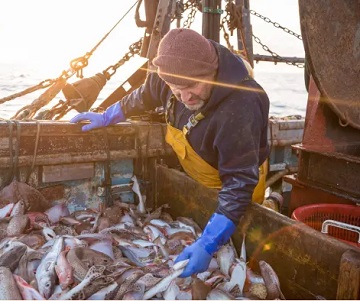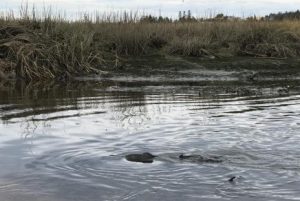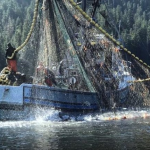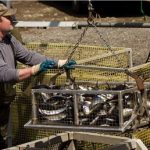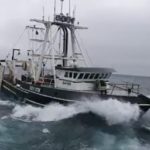Tag Archives: UK fishing industry
UK REACHES DEAL FOR CONTINUED ACCESS TO FISH IN NORWEGIAN WATERS
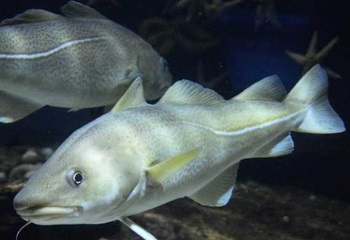 The UK has struck a deal with Norway ensuring continued access to Norwegian North Sea waters for 2025 The agreement will also secure UK quota for Arctic cod, worth over £3 million based on historic landing prices. This follows the conclusion of the UK’s wider fishing negotiations in recent weeks, which secured 720,000 tonnes of fishing opportunities for the UK fleet in 2025. The UK fishing industry will benefit from continued access to Norwegian waters to catch up to 30,000 tonnes of their whitefish quota in stocks such as cod, haddock and hake, the UK Government has been announced. more, >>CLICK TO READ<< 08:52
The UK has struck a deal with Norway ensuring continued access to Norwegian North Sea waters for 2025 The agreement will also secure UK quota for Arctic cod, worth over £3 million based on historic landing prices. This follows the conclusion of the UK’s wider fishing negotiations in recent weeks, which secured 720,000 tonnes of fishing opportunities for the UK fleet in 2025. The UK fishing industry will benefit from continued access to Norwegian waters to catch up to 30,000 tonnes of their whitefish quota in stocks such as cod, haddock and hake, the UK Government has been announced. more, >>CLICK TO READ<< 08:52
Farmer who became seafood champion takes on new roles in fishing industry
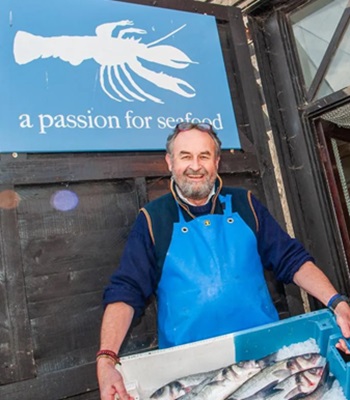 For complicated reasons, UK seafood has become marginalized in its home market. Despite a stunning coastline filled with a rich array of sea species, the UK exports much of its own fish produce to countries which appreciate it – only to import vast amounts of seafood for home consumption from abroad. It’s a conundrum which has vexed Mike Warner, founder of A Passion for Seafood, for many years. In the UK, we stick largely to what we know – cod, haddock, farmed salmon, tinned tuna and prawns – most of which is sourced from abroad. Meanwhile there are 40 to 50 commercial marine species which UK consumers largely ignore, and which instead make their way to high-class continental restaurants and to grateful seafood connoisseurs. “We have got a paradox in this country that we export 80% of what we catch and import 80% of what we consume,” he says. more, >>CLICK TO READ<< 13:09
For complicated reasons, UK seafood has become marginalized in its home market. Despite a stunning coastline filled with a rich array of sea species, the UK exports much of its own fish produce to countries which appreciate it – only to import vast amounts of seafood for home consumption from abroad. It’s a conundrum which has vexed Mike Warner, founder of A Passion for Seafood, for many years. In the UK, we stick largely to what we know – cod, haddock, farmed salmon, tinned tuna and prawns – most of which is sourced from abroad. Meanwhile there are 40 to 50 commercial marine species which UK consumers largely ignore, and which instead make their way to high-class continental restaurants and to grateful seafood connoisseurs. “We have got a paradox in this country that we export 80% of what we catch and import 80% of what we consume,” he says. more, >>CLICK TO READ<< 13:09

Sleeping skipper caused vessel collision in Sussex – ‘Could have had disastrous consequences’
The skipper of a fishing trawler has been ordered to pay £10,000 after falling asleep during his watch, causing the vessel to collide with another in Sussex, the Maritime and Coastguard Agency has said. On January 15, 2022, Maurice Reid, aged 44, of Fraserburgh, was in charge of the fishing vessel Margaret Anne’s journey when he ‘started to fall asleep’, the government agency said. A spokesperson added: “Moments later the vessel collided with anchored fishing vessel Blackbird in the Shoreham area, off the south coast of Sussex, causing minor injuries to the two men onboard. more, >>CLICK TO READ<< 09:38
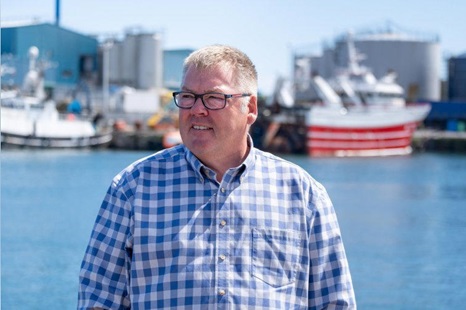
‘I’m a fisherman and lifelong Tory who voted Brexit. I won’t vote for them again’
Fisherman James Stephen has been at sea for more than 40 years. Based in Peterhead, Aberdeenshire, which is home to the largest fishing port in Europe, he voted for Brexit in 2016 in the hope it would give his community a greater share of fishing in UK waters. But eight years on, he feels he was sold a “pack of lies” and says it has cost the Conservatives his vote at the general election. “I would say that 99 per cent of the fishing industry would have voted for Brexit in the hope that we could get back control of our waters, rightfully get our share of [fishing] quota which was given away when we joined the EU,” says Mr Stephen. “I hoped, by voting for Brexit, we could undo some of the unjust that was done to the industry then. But for me, it’s been a total disaster. Nothing we were promised materialised.” Photos, more, >>CLICK TO READ<< 06:40
UK fishing industry to benefit from cutting-edge technology to help manage fish stocks
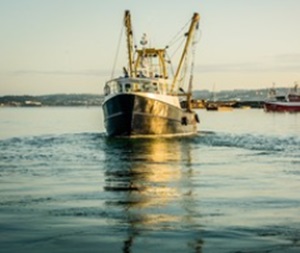 The sustainability of UK fish stocks will be better safeguarded through the use of technology to monitor and manage fishing activity in English waters, the government has announced today (13 May). The technology – known as Remote Electronic Monitoring (REM) – involves using camera, gear sensors and GPS units to make sure that catches are accurately recorded and fish are not unlawfully thrown back into the sea. The data captured will support the fishing industry to manage stocks sustainably and give retailers and consumers greater confidence about the sustainability of our fish. Volunteers within five priority fisheries will begin to use REM systems from this summer, with their work helping to refine the UK’s monitoring objectives and ensure the technology works for fishers. more, >>CLICK TO READ<< 06:02
The sustainability of UK fish stocks will be better safeguarded through the use of technology to monitor and manage fishing activity in English waters, the government has announced today (13 May). The technology – known as Remote Electronic Monitoring (REM) – involves using camera, gear sensors and GPS units to make sure that catches are accurately recorded and fish are not unlawfully thrown back into the sea. The data captured will support the fishing industry to manage stocks sustainably and give retailers and consumers greater confidence about the sustainability of our fish. Volunteers within five priority fisheries will begin to use REM systems from this summer, with their work helping to refine the UK’s monitoring objectives and ensure the technology works for fishers. more, >>CLICK TO READ<< 06:02
A New Chapter In Newlyn’s Fishing Legacy: Formalising The Fish Auction Agreement
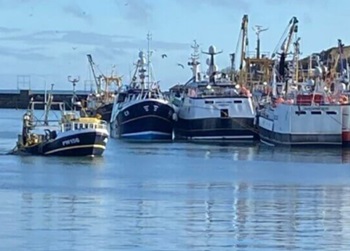 In a significant development for the Port of Newlyn, the Newlyn Pier & Harbour Commissioners (NP&HC) and W Stevenson & Sons Limited (WS&S) have finalised a landmark agreement, poised to redefine the UK’s leading quality fish auction from 1st April 2024. This formalization solidifies a longstanding and productive relationship, setting the stage for a modernised partnership aimed at bolstering the facilities and services for the Cornish fleet and the wider UK fishing industry. With the agreement set to activate on the 1st of April, WS&S will assume exclusive auctioneering rights at Newlyn Fish Market for a duration of seven years. more, >>click to read<< 10:31
In a significant development for the Port of Newlyn, the Newlyn Pier & Harbour Commissioners (NP&HC) and W Stevenson & Sons Limited (WS&S) have finalised a landmark agreement, poised to redefine the UK’s leading quality fish auction from 1st April 2024. This formalization solidifies a longstanding and productive relationship, setting the stage for a modernised partnership aimed at bolstering the facilities and services for the Cornish fleet and the wider UK fishing industry. With the agreement set to activate on the 1st of April, WS&S will assume exclusive auctioneering rights at Newlyn Fish Market for a duration of seven years. more, >>click to read<< 10:31
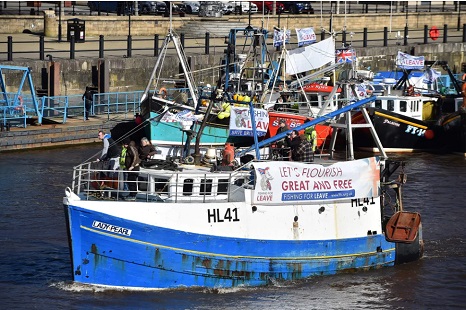
Hook, Line, and Sinker: How Brexit betrayed the UK fishing industry
Retired fisherman Charlie Waddy, former first mate of the Kirkella, knows what’s at stake on the ocean. His close friend died while working on deck beside him; his father was lost at sea returning from Iceland and Norway when Waddy, the youngest of seven children, was just three years old. But for the desperate hand of a nearby crewmate, Waddy himself nearly went overboard, his chances of survival slim in the frigid and pulsating waters below. Believing evocative memories of trawlers departing for distant seas might be reclaimed, Waddy voted for Brexit. He said he now felt betrayed by politicians who extoled the benefits of leaving the EU but then failed to deliver. “I wish I never,” he sighed. “They told us everything that we wanted to hear.” Photos, > click to read< 08:30

The fishermen
Jose Quezon’s hands moved like the parts of a well-oiled machine. It was April 1 2021, and the Northern Osprey, a 20m fishing trawler that sails out of Kilkeel, Northern Ireland, was in UK waters near the Isle of Man. The boat and its crew, four Filipinos and one British captain, had been at sea since dawn two days before. But Quezon had been at sea for the majority of his adult life. He had worked as a deckhand in the Philippines for 14 years and, since 2009, on British-flagged boats fishing out of UK ports. Technically, Quezon lived in the Philippines. But each year, he boarded a plane in Manila and flew to Belfast in Northern Ireland or Aberdeen in Scotland. When he arrived, his visa gave him 48 hours to transit through the UK to join a ship, which he’d live on for the next eight to 12 months. >click to read< 20:56
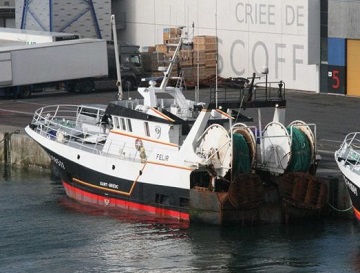
French Master and fishing vessel owner fined at Plymouth Magistrates
The owner and the master of France-registered fishing vessel ‘Felir’ SB918511 were fined a total of £8,000 and ordered to pay £6000 in costs plus £380 in victim surcharges by Plymouth magistrates. The financial penalties were imposed after the vessel’s owner Felir SAS and master Ludovic Fourgault admitted using fishing gear to which was attached a device, namely a piece of diamond shaped mesh placed over the square mesh panel, that obstructed or otherwise diminished the mesh size of part of the towed gear. >click to read< 08:43
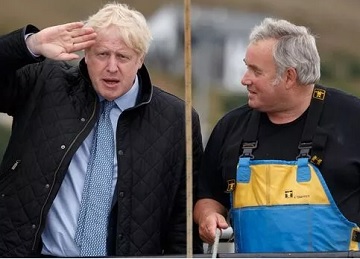
‘A bloody lie!’ Boris torn apart over ‘take back control’ promise as UK fishermen rage
Boris Johnson has been branded a liar over his Brexit promise that the UK would “take back control” of its waters, with warnings the UK fishing industry is now “on its last legs”. The former Prime Minister, who pledged to “Get Brexit Done”, had promised to protect the industry before signing a trade deal with the European Union. The fishing agreement states there would be a five-year transition period that would see EU boats continue to gain access to UK waters until 2026. But June Mummery, the former MEP for East of England and founder of Renaissance of the East Anglian Fisheries, has launched a furious attack against Mr Johnson, claiming UK fishermen have been “stabbed in the back”. >click to read< 08:16
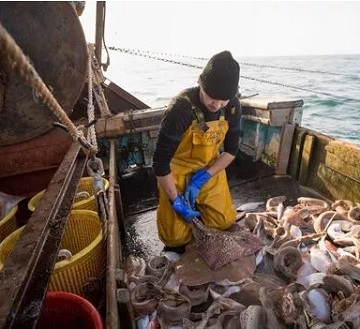
UK fishing industry ‘on its last legs’ as Tories accused of ‘betraying’ coastal towns
Fishing rights for EU vessels have proved to be a major bone of contention for the industry since leaving the bloc more than three years ago. Brexit fury has exploded after claims the UK fishing industry is “on its after legs” with Boris Johnson and the Tories accused of “stabbing fishermen in the back” over the deal with the European Union. The former Prime Minister had promised to protect the industry and insisted the UK would “take back control” of its waters before signing a trade deal with Brussels more than three years ago. The fishing agreement states there would be a five-year transition period that would see EU boats continue to gain access to UK waters until 2026. At the time, Mr Johnson admitted some concessions had been made in talks with the EU. >click to read< 09:43
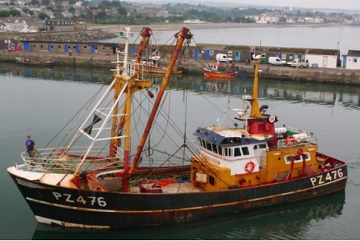
Angry and frustrated
‘What was delivered in terms of additional fishing opportunities and control over access was very far from what any self-respecting coastal state might expect,’ an NFFO representative commented. All the same, the NFFO remains certain that ‘escaping the dead clutches of the overcentralised and cumbersome Common Fisheries Policy’ is regarded by many as a major positive – ‘although a huge amount of work remains to be done to realise the benefit of this new framework, especially through the development and implementation of fisheries management plans, it is a huge opportunity.’ The NFFO states that against this background, it is disappointing that the promised agility of the new framework to deliver effective and timely outcomes has been thwarted by the UK’s own legislative systems. >click to read< 10:14
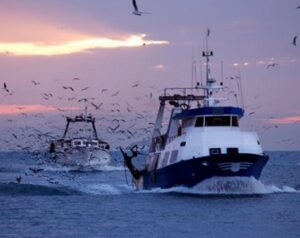
Defra announces EU fishing deal to increase fishing opportunities to £750m
Defra has announced the UK fishing industry will benefit from 140,000 tonnes of fishing opportunities next year, following the conclusion of negotiations with the EU. The deal, announced yesterday, represented a 30,000-tonne increase on pre-Brexit volumes and would present UK boats with opportunities worth over £280m in 2023 in EU waters. This brought the total value of fishing opportunities secured for the UK fleet in 2023 in the three main negotiation forums to £750m, a £34m increase from last year, Defra said. >click to read< 09:15
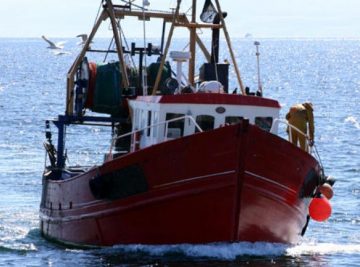
UK fishing industry reports Brexit woes
As well as the issue of quotas for wild-catch fisheries, the report finds, the UK’s seafood industry has been struggling with increased paperwork for exports to the European Union and labour shortages following new restrictions on recruiting staff from the EU. In winter 2021, the APPG on Fisheries released a survey to collate experiences of Brexit as reported by members of the fishing industry. Responses revealed significant and shared concerns around financial losses and the long-term viability of individual businesses, fishing fleets, and other parts of the industry including processors and transporters. >click to continue< 15:30
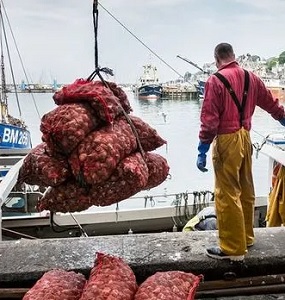
Brexit fishing victory as England’s most lucrative port lands record £43.6m of seafood
Brixham Fish Market, in Devon, topped 2020’s £35.8million and the previous £40.3million record from 2017. And contrary to many Remainers predicting that leaving the EU would destroy the UK’s fishing industry, Barry Young, boss of Brixham Trawler Agents, said the port had thrived. The news emerged shortly after a change in post-Brexit fishing rules will increase the minimum percentage of British crew members that must be on board vessels to 70 percent. >click to read< 07:50
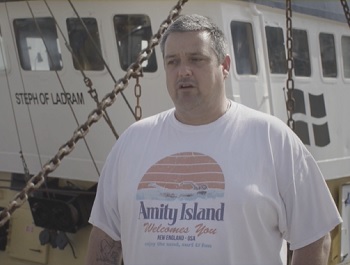
Parts of UK fishing industry feel ‘stabbed in the back’ by Brexit deal
One of the major selling points of Brexit was that it would limit access to foreign trawlers and increase quotas for the UK industry. In the end, only minor changes took place, phased in over five years. Skipper Paul Corin voted for Brexit. Now he feels betrayed and has had to sell his family-owned trawler to keep the business alive. “The exports improved after Brexit with a lot of hard work from people, but the increase in quota that we were promised just didn’t materialize. This was a family boat, but we had to sell to a bigger company. We just didn’t have enough quota to keep the vessel running and make a profit,” Corin explained. “I think we were all stabbed in the back, we were promised lots of stuff and it hasn’t materialized and it’s not going to materialize,”,,, video, >click to read< 13:00

Michael Gove’s startling Brexit admission: ‘EU will continue to have access to UK waters
Despite Downing Street calling a “mutual compromise”, it does seem Prime Minister Boris Johnson capitulated on one of the most contentious areas of Brexit trade talks: fishing rights. The UK wanted any fishing agreement to be separate from the trade deal with access negotiated annually in a similar fashion to Norway’s agreement with the bloc. Norway is an independent coastal state, with the rights and responsibilities under international law associated with that status. Stocks shared with the EU are managed through annual bilateral negotiations. Each autumn these talks set total allowable catches on the basis of scientific advice. This contrasts starkly with the position of the UK fishing industry within the EU’s Common Fisheries Policy, something the EU wanted to maintain at all costs. >click to read< 08:14
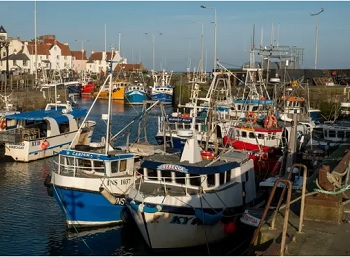
Coronavirus: UK Fishing industry shrank ‘dramatically’ during pandemic
Activity fell sharply in Britain and China in 2020 but increased in US, Japan and South Korea. In a year of unprecedented decline, the UK and China saw the most “dramatic declines” in fishing activity,, In Britain, whose fishing industry was badly hit by storms in the months before the pandemic, there was a drop,,, while in China there was a fall,, . Fishing activity also decreased in Italy, Spain, France and Norway, mostly in the first months of 2020. Early on in the pandemic, boats were tied up and many workers in the Scottish fishing industry were forced to use food banks as export demand fell, restaurants were closed and lockdown restrictions were introduced all over the UK. >click to read< 16:02
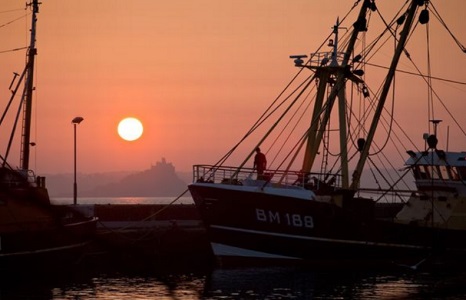
SW Cornwall fishing industry fears destruction from Coronavirus and a ‘no deal’ Brexit double whammy
The South West fishing industry faces potential destruction from a “no deal” Brexit coupled with the ongoing coronavirus pandemic, a leading industry figure says. Jim Portus, chief executive of the South Western Fish Producer Organisation, said there is concern a “bad deal” or “no deal”, when the transition period ends in January 2021, will be disastrous for the UK fishing industry, which led the march for Brexit. He said: “I don’t want to see fishermen sacrificed for the UK to get a good deal. We want to be part of that good deal. We’re in a situation where we could face a double dose of nightmare with Covid and Brexit and our fishing industry risks being destroyed. >click to read< 17:10
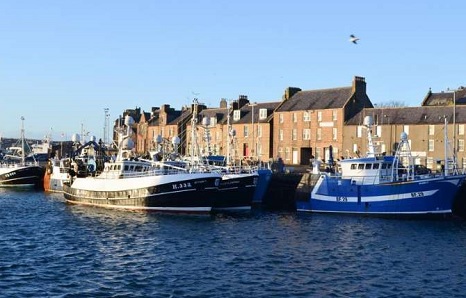
Coronavirus is death knell for Scottish fishing industry
A full four-fifths of the fleet is currently tied up, estimates veteran Fraserburgh skipper Mark Robertson. Like businesses the world over, British fishing has collapsed in the wake of the coronavirus pandemic. “Sales have totally died a death. We’re not exporting anything. There is no market,” Robertson laments. In keeping with the wider UK fishing industry, the vast majority of his catch, upwards of 80%, is sold in Europe. As the continent awoke to the COVID-19 crisis and went into lockdown, demand for his product crashed. >click to read< 07:47
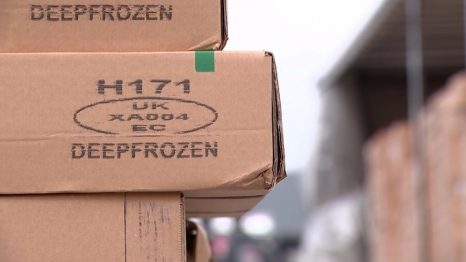
Fears UK fishing industry losing out on £230 million and 2,700 jobs
The number of people employed in the UK fishing industry is officially falling and so too is the quantity of fish being landed in the UK. While prices are up, there is still concern amongst many in the industry about how much value the UK derives from its own fleet and fish quota. Figures exclusively leaked to ITV News show publicly for the first time precisely how little benefit the UK gains from some of its own fishing fleet. Many “British” boats are foreign owned and, as the statistics show, some of these never land a single fish in the UK. Video, click here to read the story 11:25
What the UK’s fishing industry wants from Brexit
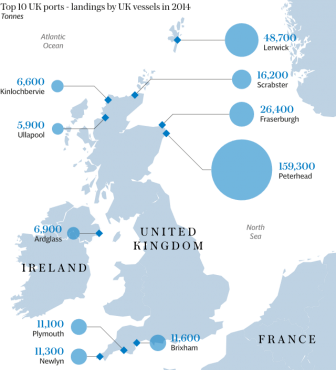 By the time dawn breaks behind the tall towers of Canary Wharf in London, home to dozens of banks and other financial institutions, Bill Thornton is already halfway through his day. A trader for 35 years, he is used to hard work and waking up in the early hours of the morning. But Thornton is not a banker. He doesn’t wear a suit or tie and there is not a briefcase in sight. His domain lies in the shadow of the big banks – in Billingsgate fish market. At James Nash & Son, the Billingsgate wholesale fish merchant where Thornton works, you have to be up early to see the array of fish on display: cod from Peterhead, skate from Aberdeen and lemon sole from Newlyn. Most have travelled from trawler to market within 24 hours. Many here are celebrating the Brexit vote. The fishing industry was a focal point of the EU referendum campaign. Nigel Farage, the former Ukip leader, has since said that the industry is a touchstone for Brexit. Leaving the EU means “getting our fishing waters back” – or we haven’t really left at all. Thornton, who voted for Brexit, has felt the impact of the EU’s common fisheries policy personally. “It decimated the fishing industry,” he says. “Our price of entry to the EU was giving up our fishing rights. Ted Heath sold us down the river.” Read the story here 07:55
By the time dawn breaks behind the tall towers of Canary Wharf in London, home to dozens of banks and other financial institutions, Bill Thornton is already halfway through his day. A trader for 35 years, he is used to hard work and waking up in the early hours of the morning. But Thornton is not a banker. He doesn’t wear a suit or tie and there is not a briefcase in sight. His domain lies in the shadow of the big banks – in Billingsgate fish market. At James Nash & Son, the Billingsgate wholesale fish merchant where Thornton works, you have to be up early to see the array of fish on display: cod from Peterhead, skate from Aberdeen and lemon sole from Newlyn. Most have travelled from trawler to market within 24 hours. Many here are celebrating the Brexit vote. The fishing industry was a focal point of the EU referendum campaign. Nigel Farage, the former Ukip leader, has since said that the industry is a touchstone for Brexit. Leaving the EU means “getting our fishing waters back” – or we haven’t really left at all. Thornton, who voted for Brexit, has felt the impact of the EU’s common fisheries policy personally. “It decimated the fishing industry,” he says. “Our price of entry to the EU was giving up our fishing rights. Ted Heath sold us down the river.” Read the story here 07:55
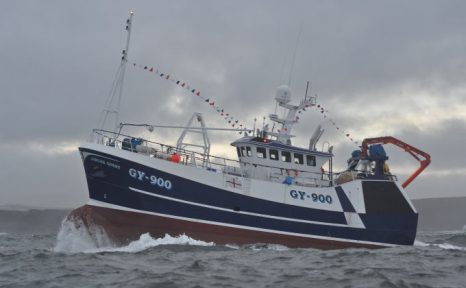
Brexit – Entering uncharted territory,turbulent waters, with challenges and perhaps also opportunities.
Two things can be said with certainty: 1. At this stage there are more questions than answers 2. In this new world, fishermen will need a strong, cohesive, national organisation to defend their interests during the upcoming transition It is not difficult to understand the strong anti-EU sentiments within the UK fishing industry. The European Commission has too often behaved with arrogance, and the EU Parliament with ignorance, to escape their share of the blame. To understand this, you need to go no further that the Commission’s proposed EU ban on small-scale drift nets – to solve an enforcement problem in Italy but which if adopted would have extinguished many sustainable, viable small-scale fisheries in the UK. This is but one example which just illustrates the roots of the frustration that has built over many years. Read the rest here 14:41
Where are the fishermen/fishers/fisherfolk in all this?
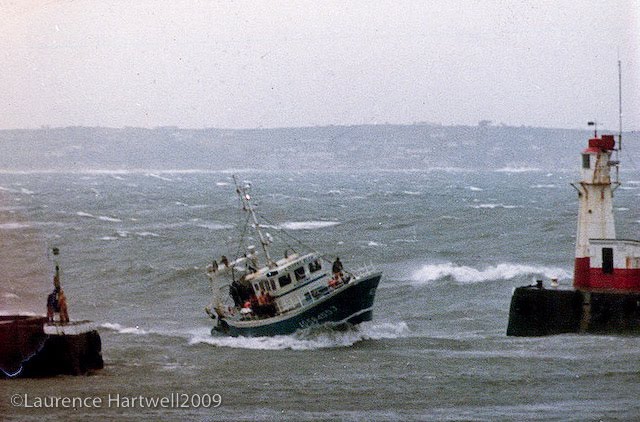 With the working title, “Discard ban can benefit fish and fishers, but sustainability must come first” here are the opening lines of an article written by Bryce Stewart – and you wonder why fishermen get a tad upset when they read this kind of thing! Read more here 22:29
With the working title, “Discard ban can benefit fish and fishers, but sustainability must come first” here are the opening lines of an article written by Bryce Stewart – and you wonder why fishermen get a tad upset when they read this kind of thing! Read more here 22:29






